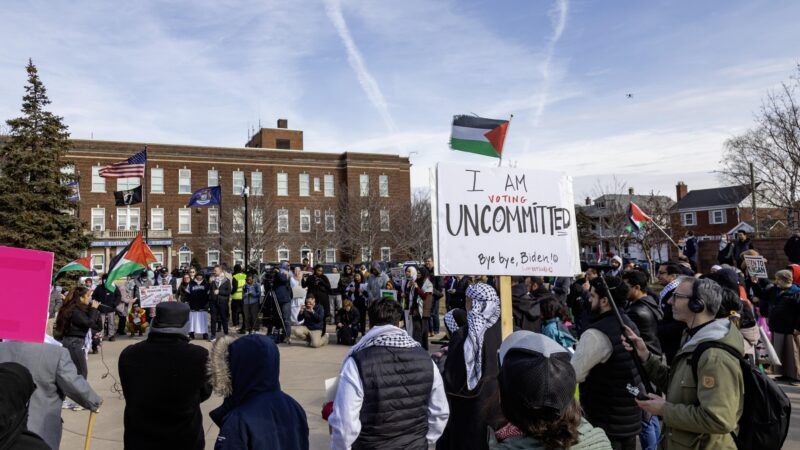Democratic Hubris Blows Up in Michigan
Democrats assumed they could campaign as neoconservatives while keeping Middle Eastern votes. They were wrong.

Perhaps Vice President Kamala Harris thought she could take Michigan's Middle Eastern communities for granted. In a state with a huge Iraqi-American community, Harris touted the endorsement of former Vice President Dick Cheney—who helped destroy Iraq—and campaigned alongside his equally neoconservative daughter, former Republican congresswoman Liz Cheney. And in a state with a huge Lebanese- and Palestinian-American community, one of the Harris campaign's closing messages was a pro-Israel rant delivered by former President Bill Clinton.
The Uncommitted movement, which represented around 100,000 dissatisfied Democrats in Michigan, warned that Harris would have to give at least a symbolic concession to Palestinian rights in order for those voters to come home. Democratic leadership brushed off the risks, arguing that the wars in the Middle East wouldn't be a salient issue. After all, former President Donald Trump "wants to put a ban on Arabs coming into the country," President Joe Biden said. "We'll make sure we understand who cares about the Arab population." What would Arab Americans do? Vote for Trump?
The answer, it turns out, was yes. Trump won around 42 percent of the vote in Dearborn, a heavily Arab suburb of Detroit, compared to 36 percent for Harris, and the rest for third-party candidates, according to the latest results. It was a shocking result in a community that had gone 74 percent for Biden in 2020. But it wasn't a surprising one. Muslim and Arab-American figures had been warning for months that foreign policy was a make-or-break issue in parts of Michigan. And Trump made a real effort to win over those votes, including reaching out to Abdullah Hammoud, the Democratic mayor of Dearborn.
Hammoud refused to endorse either candidate. He said he wouldn't be "fooled" by Trump, who supported Israel against Palestinians and supported the Saudi-led war in Yemen. (It's worth mentioning that Michigan also has a large Yemeni-American community.) Hammoud also denounced the Biden administration's massive support for Israeli military campaigns and the Harris campaign's decision to send Cheney and Clinton to Michigan as surrogates.
Clinton's speech on November 1 appeared to be particularly insulting to the Arab and Muslim communities. He started off by saying that he understands "why young Palestinian- and Arab-Americans in Michigan think too many people have died" in Israel's wars. "The people who criticize it are essentially saying, yeah but look how many people you've killed in retaliation, so how many is enough for you to kill to punish them for the terrible things they did?" he said.
But Clinton quickly took a different turn: "That all sounds nice until you realize, what would you do if it was your family and you hadn't done anything but support a homeland for the Palestinians and one day they come for you?" Then, unprompted, Clinton began to talk about how Israelis "were there first" in "Judea and Samaria," an Israeli nationalist term for the West Bank, and how a Palestinian leader had told him that Arabs "only care about [Palestinians] when they need to blame America and Israel for their people being upset."
Trump, instead of being condescending to Middle Eastern voters, spoke to them as if he wanted their votes. "They could turn the election one way or the other," Trump said at an October 26 rally alongside Muslim clergy in Michigan. "The Muslim and Arab voters in Michigan and across the country want a stop to the endless wars and a return to peace in the Middle East. That's all they want," Trump added. He also attacked Harris for campaigning alongside Cheney, the "Muslim-hating warmonger."
Harris tried to do damage control at a November 4 rally alongside Arab-American leaders in Michigan, promising to "do everything in my power to end the war in Gaza, to bring home the hostages, end the suffering in Gaza, ensure Israel is secure and ensure the Palestinian people can realize their right to dignity, freedom, security and self-determination."
Michigan has around 211,405 Arab-American residents, and around 241,828 Muslim residents. Each community on its own makes up just above 2 percent of the state's population. (They overlap, but not entirely. Many Muslims in Michigan are not Arab, many Arabs are Christian, and many of the Chaldean-Assyrian Iraqis in Michigan consider themselves neither Arab nor Muslim.) As it stands, Trump leads in Michigan by a little over 93,000 votes.
Whether Trump actually follows through on his promises—or uses ending endless wars as an excuse for even more military escalation—remains to be seen. After all, his first administration was filled with Iran-obsessed war hawks, and many of the same names are on his cabinet shortlist.
But the fact that he made those promises to begin with shows how the foreign policy dynamics of presidential elections have changed. Democrats had assumed that it was a matter of out-hawking the competition. Now, dovish swing voters have made clear that there is a political cost to war. Both parties ignore it at their peril.


Show Comments (43)